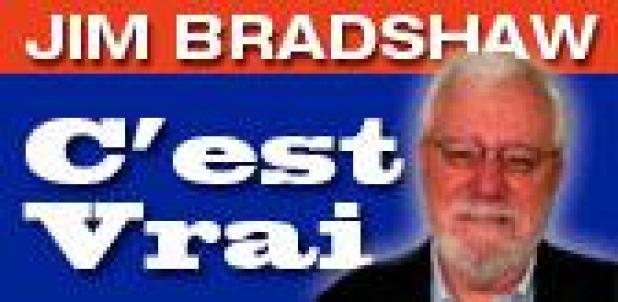
Jim Bradshaw: Some roads were built to save horses
Bad roads have been a headache in Louisiana ever since we’ve had roads to maintain and politicians who wanted to pave them with anything but tax money. The sticking points have been the same over the years: We want good roads, but nobody wants to pay for them. But in January 1913, former governor Jared Y. Sanders, made a different plea to a St. Landry Parish audience.
He said citizens should demand good roads, if not for themselves, for the poor horses that had to pull wagons through miles of mud.
Sanders, who was described by the St. Landry Clarion in its Jan. 25 edition as “one of the biggest men in Louisiana, both mentally and physically,” was a native of St. Mary Parish who served as speaker of the Louisiana House of Representatives from 1900 to 1914, lieutenant governor from 1904 to 1908, governor from 1908, and in the U.S. Congress from 1917 to 1921. One of his later claims to fame — or infamy — was a brief fistfight he had with Huey Long in a New Orleans Hotel lobby. (Reporters said Sanders won.)
One biographer describes him as the “father of the Good Roads Movement in Louisiana.” That movement began as a campaign in the late 1890s by enthusiasts who wanted to get their newly invented bicycles out of the mud. By 1913 it had turned into a national movement to give country folk the same benefits as city-dwellers who enjoyed paved streets.
It was apparently an idea that had some appeal in rural Louisiana. According to the Clarion, “Long before his arrival … the courthouse was densely packed with an enthusiastic … audience … [filling] every foot of standing room.” The crowd was made up of “representatives of every portion of St. Landry and Evangeline” and included not only public officials “but also an overwhelming number of our planters and farmers, bankers, merchants, professional men … [and] a generous sprinkling of our country’s purest and best product, the ladies.”
According to the Clarion report, Sanders “showed that every year [St. Landry Parish] spends some $30,000 on our ordinary dirt roads, and that we literally sink every cent of it in the mud, [since the roads remain] as inaccessible in bad weather as the year before.”
Because of that, he said, farmers “are wearing out and killing the teams that cost them so dear, not in hauling a fair load to market, at a fair rate of speed, but in dragging along, sometimes inch by inch, with from one-fourth to one-sixth of what would be a fair load on a decent road.”
Besides pity for the horses, the rural folk needed to think about the expense of it all. Farmers had to keep up “six horses or more to do less than one ought to be able to do … our wagons last one-fifth the time they should, our buggies one-sixth … [and] we have to buy seven sets of harness where one should serve us,” Sanders said.
Even then, despite “extra horses, extra vehicles, extra harnesses, small loads with big expenses … when a spell of protracted bad weather comes along we have to do one of two things: Stay isolated from our s neighbors and those we trade with, or get hopelessly bogged or at the best put to untold discomfort.”
So, what should be done to save the horses and fend off discomfort?
“We must do what other states have done,” Sanders said. “We must build permanent, scientific, well drained roads, roads which once built, we will only have to maintain, not to re-build anew every year, roads which we can travel on with comfort and even with pleasure, roads we will not have to approach as warily as we would a treacherous quicksand, roads we can depend on to take us with an ordinary team and a good load to our shipping points, our markets, or wherever we would, and tell our wives to expect us back for our meals.”
He urged quick action. To those “who tell us the taxes will be too heavy, we can answer that the roads are too heavy too,” Sanders said 105 years ago. “We must have good country roads and highways, and paved streets in our … towns and cities, unless we expect to let Louisiana, now rising in her progress, fall back in the mud.”
Does all of this sound vaguely familiar to you, too?
A collection of Jim Bradshaw’s columns, Cajuns and Other Characters, is now available from Pelican Publishing. You can contact him at jimbradshaw4321@gmail.com or P.O. Box 1121, Washington LA 70589.
